CCNA – Drag and Drop 5
Here you will find answers to Drag and Drop Questions – Part 5
Question 1
Drag the Cisco default administrative distance to the appropriate routing protocol or route (Not all options are used)
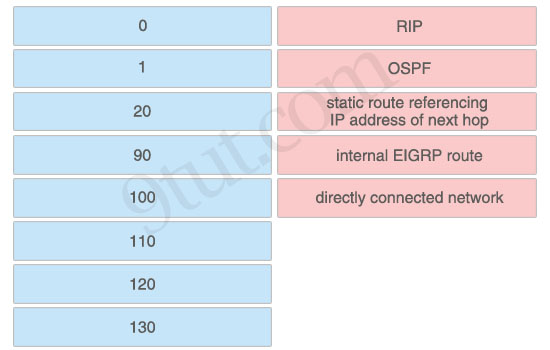
Answer:
+ RIP: 120
+ OSPF: 110
+ static route referencing IP address of next hop: 1
+ internal EIGRP route: 90
+ directly connected network: 0
Question 2
Drag the term on the left to its definition on the right (not all options are used)
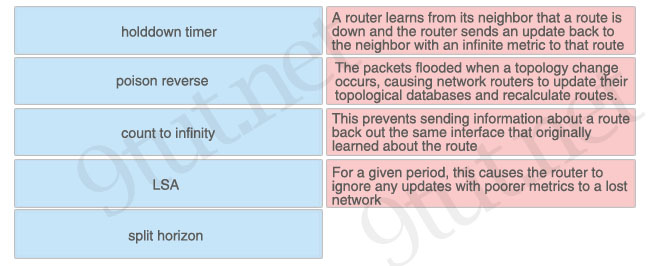
Answer:
+ poison reverse: A router learns from its neighbor that a route is down and the router sends an update back to the neighbor with an infinite metric to that route
+ LSA: The packets flooded when a topology change occurs, causing network routers to update their topological databases and recalculate routes
+ split horizon: This prevents sending information about a routeback out the same interface that originally learned about the route
+ holddown timer: For a given period, this causes the router to ignore any updates with poorer metrics to a lost network
Question 3
Drag the description on the left to the correct router mode on the right
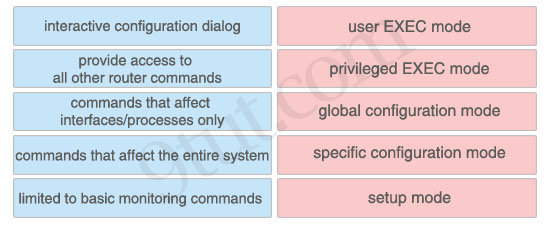
Answer:
+ user EXEC mode: limited to basic monitoring commands
+ privileged EXEC mode: provide access to all other router commands
+ global configuration mode: commands that affect the entire system
+ specific configuration mode: commands that affect interfaces/processes only
+ setup mode: interactive configuration dialog
Question 4
Drag each definition on the left to the matching term on the right
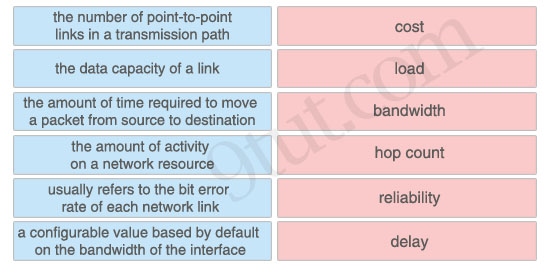
Answer:
+ cost: a configurable value based by default on the bandwidth of the interface
+ load: the amount of activity on a network resource
+ bandwidth: the data capacity of a link
+ hop count: the number of point-to-point links in a transmission path
+ reliability: usually refers to the bit error rate of each network link
+ delay: the amount of time required to move a packet from source to destination
Question 5
Refer to the exhibit. Complete the network diagram by dragging the correct device name or description to the correct location. Not all the names or descriptions will be used.
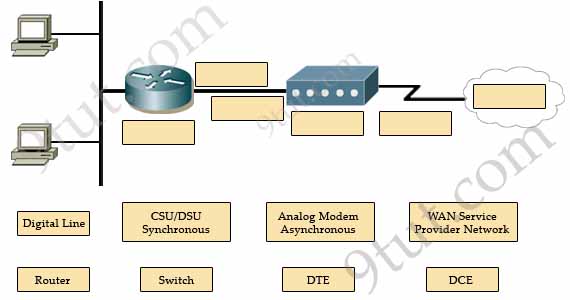
Answer:
From left to right:
Router, DTE, DCE, CSU/DSU Synchronous, Digital Line, WAN Service Provider Network.
Question 6
Drag each feature on the left to the appropriate routing protocol on the right.
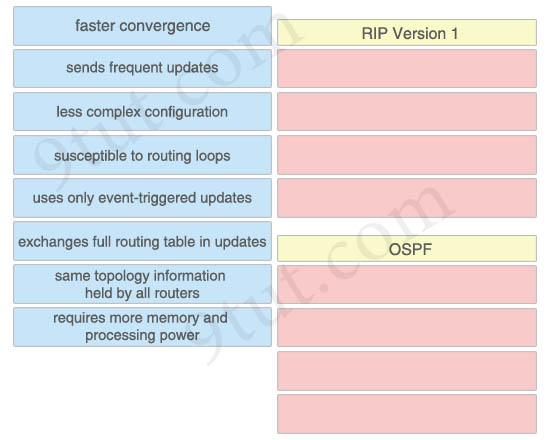
Answer:
RIP version 1
+ sends frequent updates
+ less complex configuration
+ susceptible to routing loops
+ exchanges full routing table in updates
OSPF:
+ faster convergence
+ uses only event-triggered updates
+ same topology information held by all routers
+ requires more memory and processing power
Question 7
Drag item on left to match item on right
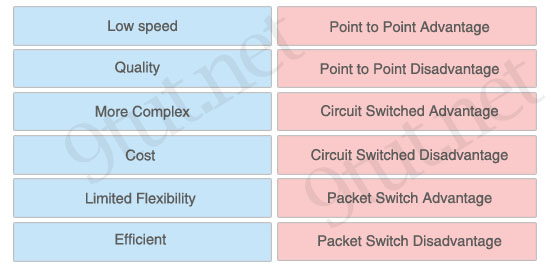
Answer:
+ Point to Point Advantage: Quality
+ Point to Point Disadvantage: Limited Flexibility
+ Circuit Switched Advantage: Cost
+ Circuit Switched Disadvantage: Low speed
+ Packet Switch Advantage: Efficient
+ Packet Switch Disadvantage: More Complex
Question 8
All hosts in the same subnet with 172.16.5.118/26 must be denied Telnet access to hosts outside the LAN (u need to just drag & drop) fiil out the command. To complete the bracketed command, [access-list list-number deny tcp 172.16.5.address 0.0.0.mask any eq port], drag each appropriate option on the left to its proper placeholder on the right. (Not all options are used)
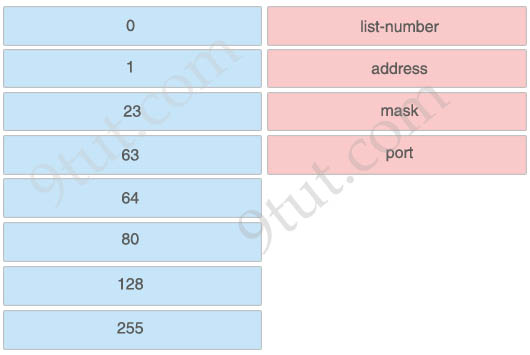
Answer:
+ list-number: 128
+ address: 64
+ mask: 63
+ port: 23



27-06-2012
latest DUMP
http://www.examcollection.com/cisco/Cisco.ActualTests.640-802.v2012-06-27.by.Napoleon.643q.vce.file.html
@ENJ
P2P
advantage: quality
disadvantage: limited flexibility
ckt swtchd
advantage: cost
disadvantage: low speed
pkt swtchd
advantage: efficient
disadvantage: more complex
@ 9TUT
Q8. There seems to be a problem with the access-list-number.jpg not loading.
@learning: Yes, thanks for your detection. I updated it!
q7 is my problem— why is packet switched efficient? I would think that it would be cost
and circuit switched advantage would be efficient
and I wouldnt think circuit switched disadvantage is slow speed — I would think that circuit switched is faster than packet switched — but what do I know??
frame relay is packet switching;;; circuit switching is phone call;;; tolerance for delay — packet switching takes time to reassemble====== voice and video circuit switching
leased lines or point to point or lan;;;; circuit switching –dedicated path such as dialup;;;;;packet switching –via single or multipoint link
@9tut – i m using the flash link for those questions and on Q2 there is a statement that appears 2 times.
q2— hold down timer — answer is repeated in flash session –premium user
does student have to place in right order like answer for question 6 ? anyone explain please …thanks
@ tang for Q6 just place the appropriate characteristic where its belong. in this case the order can be any how. but place the right characteristic to the right box.
@ geedub please when explaining be clear on your point. was following your explaination but got lost because of the manner u put things up. Can u please explain clearly so that we can understand. still not clear with Q7 or can anybody assist………………………..
Q7
The intention to click and drop the appropriate advantages and disadvantages for each kind of WAN.
Q8
Why is the acces-list number 128?
ACL extended have number from 100 to 199
Do we have to write full commands in simulations ?
No U dont have to enter full command for e.g u can enter en instead of enable command
Please I need complete understanding of Question 8 solution ?
I am really Finding hard this subnetting after even doing alot of questions !
Ramabolu
March 25th, 2012
I am writing exam on the first week of next month can anyone send me the latest ccna dump on solomonagyemang80@yahoo.com
pls somebody tell me abt ccna exams, do they repeat their questions especially the simulations. pls i need confirmation on that bcos am going for the exams 1st week of next month.
@9tut in Q2 you have two equal answer “for a given period…”
@Anonymous: Can you describe more clearly?
Please can anyone send me the latest ccna dump at stannnzie@yahoo.com,my exam is in a few days.Thanks
9tut, is it me or is there something very wrong about Q5? There are just too many labels for the same devices. For example, I know that Router is a DTE, but look at the label space above and below the connection to the CSU/DSU, shouldn’t that be one label there? Are they asking for multiple names per label? I am kind of confused based on what is being asked ….. please explain. Thx
Hi,
There are only six spaces to fill in but there are 8 choices, so two of them won’t be used. The blank right below the router symbol should be “router”. The line next to it should say “DTE”. Then right below the next box should say “CSU/DSU” to label the actual device. The link that connects it to the router should say “DCE” because that is the DCE end of the connection. The next one is the “digital connection” to the “Wan Service Provider”. So you won’t use “Switch” because there is no switch in the diagram. And you won’t use the “Analog Modem” either.
passed ccna exam this morning, thanks 9tut, question 5 came out
Hello,
there is a problem with the QUESTION 2 (in the flash animation, for the premium members) same definition is written twice. :/
Can you fix it ?
Thank you !
Can someone please help explain question 8 for me. I understand how to get the address and the port but I am not sure how they come up with the access list of 128 and the mask of 63? Please help
Hey i think in q 7. The advantage of circuit switching is given as cost how can a circuit switching is better than packet switching??? Coz in circuit switching there ‘ll be dedicated link even when there is no data to send…its wrong…!!!
9tut,
Q2 answers need to be fixed. There is no answer on the option for Split Horizon. Thanks
@Jamerican: Yes, thanks for your detection. I updated it.
@Adam
1)access-list list-number deny tcp 172.16.5.address 0.0.0.mask any eq port],
from this u understand its a extend accesslist..first u remeber the extende accestlist sequence number range(100 to 199) from the above condition only possibility is 128 only..
2) here they deny the network not host. 172.16.5.118/26 from this u now the subnetwork id is 64 bcz incremental value.here u assign the wildcard mask..wildcard mask is nothing but inverse of subnet mask..here the subnet mask is /26=255.255.255.192 wildcard mask is 0.0.0.63.(255-192=63)..
TY 9tut.
Today I have passed the CCNA. (860/825)
50 questions 3 labs (VTP, EIGRP, ACL). 35 from 9tut.
Also thanks a lot Brar and Sekhar (still valid from examcollection)
Ty again 9tut
from here none
I am giving ccna exam next month,will this be valid for that time,plz plz tell me
Q2,3 on ICND2 test
Please guys i need CCNA dumps for my exam coming up next week. yomadex1@gmail.com
Valid Que :D
Q:1
can someone tell me why in Q8 the last octet of the IP ADD` is 64 and the last octet of SUBNET is 63 ?
@haha
1)access-list list-number deny tcp 172.16.5.address 0.0.0.mask any eq port],
from this u understand its a extend accesslist..first u remeber the extende accestlist sequence number range(100 to 199) from the above condition only possibility is 128 only..
2) here they deny the network not host. 172.16.5.118/26 from this u now the subnetwork id is 64 bcz incremental value.here u assign the wildcard mask..wildcard mask is nothing but inverse of subnet mask..here the subnet mask is /26=255.255.255.192 wildcard mask is 0.0.0.63.(255-192=63)..
Passed CCNA, question 5 from here.
ques 5 was in my exam
thanx dat’s amazing
I don’t understand Q7, isn’t PPP and circuit switching disadvantage is high cost ?
I think one of your advertisings caused my web browser to resize, you might want to put that on your blacklist. kosiarki spalinowe http://trufle.net/dom/al,ko,kober,sp,z,o,o,kosiarki,spalinowe,s,427/
Please send me latest dumps @ saphryfa@gmail.com , Thanks.
In Question 8 why is the access list number 128??????? Thanx
Stupid Jembo! Extended Access list range from 100 to 199 and 2000 to 2699. Therefore 255 cannot be used as access list number
@ jambo , bcoz this access-list command used to be extended access -list so it’s range 100- 199 so that’s why they used 128
I need help to open the dump spike or shekter getting only 5 trial copy pls .
ACL LIST OF CONDITION:
(A)
*Host A should connect to Finance via web
*Deny Host A to reach Finance via anything else than web
*Deny other hosts access to the Finance Web Server via anything
*permit all to the servers
==========================
(B)
*permit host A to access Finance web server using https.
*block other connection from host A and LAN core to Finance web server.
*permit all other connections from LAN core to other servers.
===========================x
(C)
*Host B should be able to use a web browser(HTTP)to access the Finance Web Server
*Other types of access from host B to the Finance Web Server should be blocked
*All access from hosts in the Core or local LAN to the Finance Web Server should be blocked
*All hosts in the Core and local LAN should be able to access the Public Web Server
===========================
(D)
*The user on host C should be able to use a web browser to access financial information from the Finance Web Server.
*No other hosts from the LAN nor the Core should be able to use a web browser to access this server
*Since there are multiple resources for the corporation at this location including other resources on the Finance Web Server, all other traffic should be allowed.
===========================
(E)
*Host C should be able to use a web browser(HTTP)to access the Finance Web Server
*Other types of access from host C to the Finance Web Server should be blocked
*All access from hosts in the Core or local LAN to the Finance Web Server should be blocked
*All hosts in the Core and local LAN should be able to access the Public Web Server
============================
(F)
*allow host B to access web service of finance server
*Deny host B and Core network to access any other services on Finance server
*allow access of public server for everything from everyone
=============================
(G)
*allow ONLY host C web access to the Finance Web Server.
*No other hosts will have web access to the Finance Web Server
*all other traffic should be allowed.
===============================
(H)
*permit host B from accessing finance server
*deny host B from accessing other servers (not the whole network)
*permit everything else
==============================
(I)
*Only allow Host C to to access the financial server
*Not allow anyone else in any way communicate with the financial server
*Allow all other traffic
==============================
(J)
*Host C should be able to use a web browser(HTTP)to access the Finance Web Server
- Other types of access from host C to the Finance Web Server should be blocked
– All access from hosts in the Core or local LAN to the Finance Web Server should be blocked
*All hosts in the Core and local LAN should be able to access the Public Web Server
================================
(K)
*Host C should be able to use a web browser to access the financial web server
*Other types of access from host C to the finance web server should be blocked
*All hosts in the core and on the local LAN should be able to access the Public web server *
Jembo,
4 your knowledge buddy!!!… In this scenario, u need to work with source and destination, therefore u need an extended access list( I hope u already know that standard only matches source packets ;) so, u;d need to use a number above 100, available is 128:
access-list 128 deny tcp 172.16.5.64 0.0.0.63 any eq 23
access-list 128 remark ->all hosts from the 172.16.5.64/26 to anywhere will be denied access to port 23 (Telnet)
Regards!!
Q1 on today’s exam